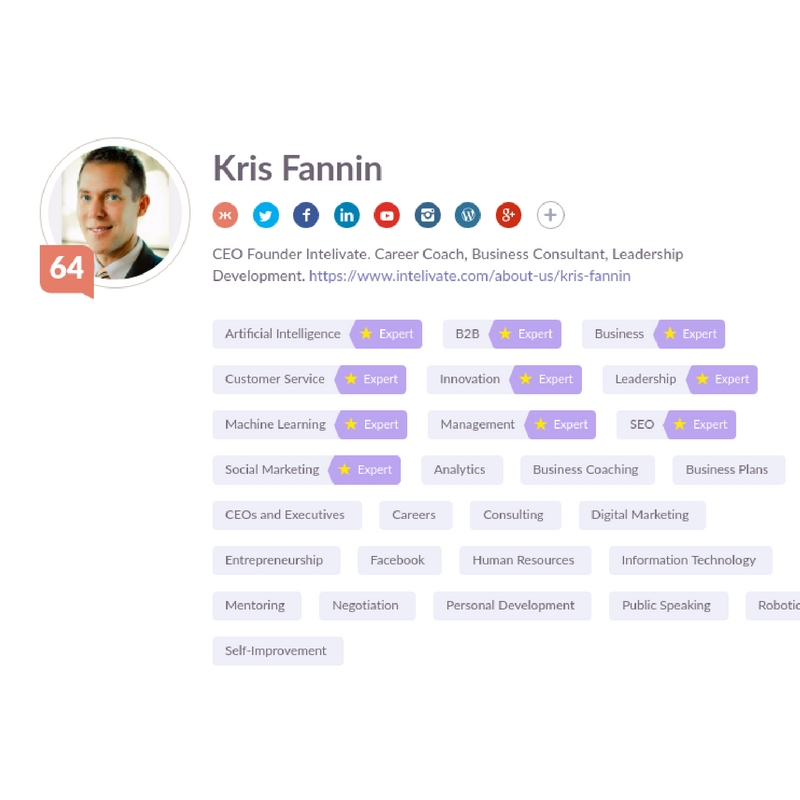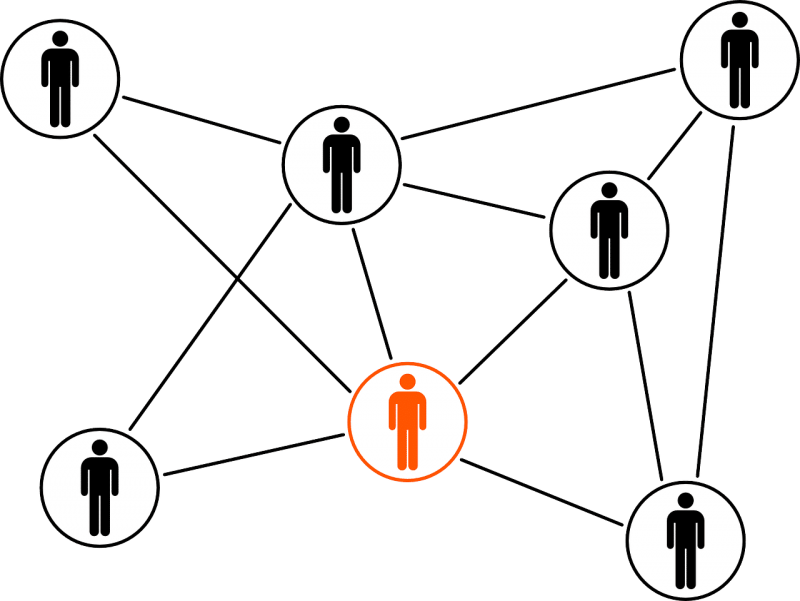The workforce continues major shifts. Here’s how to prepare for the four major 2020 trends in talent acquisition and your job search to keep you successful. You’ll get actionable strategies for both your job and candidate search.
Everything shifts and changes – including the workforce. These rapid and permanent changes in the workforce and your talent acquisition and job search strategies need to change with them.
Here are four major talent acquisition and job search trends happening in the workforce and ways you can stay ahead of the trends.
4. Artificial Intelligence (AI) and Data-Driven Talent Acquisition Decisions
It’s about time that HR and recruiting get on the big-data train. For the longest time, HR didn’t even think about allocating budget for data-driven projects.
Until now.
The recruiting and job search process is frustrating from all ends. AI and data-driven tools are rapidly changing that for candidates and employers. According to Forbes contributor, Louis Efron, only 15% of applicants are contacted after submitting an application and only 29% of businesses feel they can find the right candidates with the right skills.
Those numbers show a need to change the experience. Business is getting serious about allocating budgets for more data-driven decisions. Be on the lookout for more automation and AI driven process as more ROI is realized on data investment decisions.
New to the concept of AI (artificial intelligence)? This is a great place to start.
Why are AI and Data-Driven Talent Acquisition Happening?
As more competition for talent heightens, employers see a need for increased effectiveness and efficiency in getting the best talent.
As more investment in data projects happens in the fields of HR and recruiting, the ROI of data-backed decisions is now realized.
How are AI and Data-Driven Talent Acquisition Happening?
As AI technologies emerge, every business niche is investigating how to replace repetitive, but important parts of their business process. There are many parts of the talent acquisition process that SHOULD be replaced by automation, and the industry is finally realizing this.
Talent in the job search market is also dictating this – many people would rather parts of the process be automated just by the nature of technology adoption.
It also demonstrates that a company is on cutting-edge technology, which further feeds a desire of critical talent to want to be a part of a company that embraces it.
A prospective employer wants to know you before they meet you.
Preparing for A-I & Data-Driven Decisions: Talent Acquisition
If you are a business and don’t have a budget for a big-data initiative for HR and recruiting, it’s time to start. You’re already behind the curve.
- Start with your existing data and link it to success KPIs as a start.
- I’ve seen companies start to link HR-decisions to performance to gauge effectiveness and campaigns. It is fantastic and makes the process incredibly efficient.
- Start investing in learning about and talent experts in A-I (artificial intelligence).
- Some of the front-runners in the A-I talent acquisition are Ideal and MYA. These are technologies that are making headlines in this new niche.
Preparing for A-I & Data-Driven Decisions: Job Search
If you are currently or soon to be in the market for a job, here are some quick hits to start preparing for more data-driven decisions in the job market:
- With more data, comes the need to have more data on YOU. Give them more data – stats, performance metrics and anything qualifiable that you can turn into accurate, quantifiable data. Make sure your resume sections and structure and nearly perfect.
- Engage with chatbots and messaging systems during the process. It will soon become the norm. Those initial phone screen interviews are being conducted by chatbots more often. Yes, machines and software are making MORE of the decisions in the first part of the recruiting process.
- Get out there, be social and start showing authority. Don’t hide your social media profiles. Flaunt them to the world – but do it with strategy while providing – you guessed it – more data.
3. Increased Project-Based Hiring
The job market is changing, and the HR profession is rapidly trying to catch up. Part of this trend has been project-based talent acquisition either through part-time or contract hiring for specific initiatives.
Plan to see more of this with some of the upcoming employment laws. Larger companies have been hesitant to get on board with this trend, and these will be some of the biggest players in project-based hiring for 2020.
Project-based hiring does not necessarily mean short-term hiring. I’ve seen many contractor positions that lasted years – even more than a decade.
Why is an Increase in Project-Based Talent Acquisition Happening?
Companies are losing an arm and a leg through talent retention programs. HR managers are being ‘developed’ for attrition measures that are no longer realistic.
It’s the chicken or the egg debate as to how it started – economics or job talent? I believe it’s both.
Project-based hiring, if done right, is more economical – especially with some of the looming employment laws.
As well, a chunk of the talent pool likes the lack of commitment and the ability to explore; this is particularly the case early in their careers.
Non-core business functions are appropriate for contractor hiring.
How is an Increase in Project-Based Talent Acquisition Happening?
As more talent jumps ship quicker to explore different companies or roles, business realizes the opportunity to focus efforts on project-based rather than full-time employment. There are many benefits, including less training investment as well a decrease of resource ‘dead time.’
Talent in the job search market has embraced this project-based hiring model. Technology and project-based hiring sites make this an attractive model for even the most seasoned executive.
Preparing for Project-Based Hiring: Talent Acquisition
If you have not started project-based hiring, don’t go all-in without knowing what you are doing or if it even fits into your model. My suggestion to businesses is to first pilot contractor hiring.
Types of roles and projects to trial for contractor based hiring.
Non-core business functions are appropriate for contractor hiring. If you are a technology firm, for example, trial project-based hiring for marketing, training or some service projects may be beneficial.
If it is not your core business, think about contractor hiring for talent acquisition. The caveat – make sure it doesn’t impact your core business. For example, if customer service highly supports your market delineation in the business, I would be reluctant to advise a company to contract most of their customer service functions.
Tax and Employment Law Considerations
There are numerous tax and employment laws to consider for any position that is contractor-based.
Contractor vs. Employee
The nature of the role and ‘control’ that help to delineate contractor vs. employee. Here is an excellent breakdown: Employee Vs. Contractor: A Tax Distinction
For each hire/role, just take some time to run through how the role will operate and then make the determination of contractor vs. employee.
Keep documentation of your determination and be able to show that the role indeed works in a contractor position. Federal and state tax authorities are scrutinizing this more as project-based talent acquisition increases.
Scale Considerations
The scale at which your business plans to leverage contractors is a critical component in the planning – the larger the size, the more extensive the planning.
Contractor talent acquisition is a fantastic option to consider. Do it with strategy and lots of planning. It’s not the right model for all companies or cultures.
If it’s not your core business, consider project-based talent acquisition.
Preparing for Project-Based Hiring: Job Search
If you are currently or soon to be in the market for a job, here are some quick hits to start preparing for project-based talent acquisition:
- Be open to the possibility of project-based work in your job search. It will open up a wealth of opportunity. Indicate that your willingness to consider contractor-based opportunities in your social media profiles and resume.
- Contractor-based work is often remote or virtual in nature. If you have no virtual office experience, there are some adjustments and the benefits often outweigh the drawbacks if you plan your virtual job and home office right.
- While employers benefit from the lack of downtime between projects, you need to plan for that lapse in pay if the majority of your job search strategy involves project-based work. If experienced in temporary employment, start calculating the average between projects and make sure to buffer your savings accordingly.
- If you have experience in project-based assignments, indicate it on your resume and social networking profiles during your job search. Let the recruiter (or chatbot) know early in the screening process that you are open and experienced to contractor work as there could be other opportunities in the organization.
- If you accept a project-based assignment, it’s critical that you continue to network and promote yourself even after your job search. This will give you the greatest possibility of minimal downtime before your next assignment.
2. Increased Use of Social Media for Talent Acquisition and Job Search
In line with increased automation, recruiters will move more efforts to social media. Because the algorithms in social platforms have evolved, there is a wealth of opportunity to start looking for the perfect candidate as opposed to waiting and hoping you get the person.
Stronger social algorithms combined with inexpensive but powerful social media tools equate to much more use of social in HR and recruiting.
Candidates are moving more to social media for their job search. Why? They trust social media more than an advertisement or the usual job posting.
Why is an Increased Use of Social Media in Talent Acquisition and Job Search Happening?
Social media has become smarter and more integrated with traditional search over the years. If you are searching for anything in particular, you can either establish an ongoing search or let any of the social media platforms learn what you are looking for over time.
When doing a job search, a candidate not only learns about the position but also your business. How do you treat your customers? The talent you want is watching that on social media.
For recruiters, social media is a way to get to know a potential candidate even before an interaction. That’s why it’s critical you clean up your social media persona before you start your job search.
How is an Increased Use of Social Media in Talent Acquisition and Job Search Happening?
Technology and the complete integration of social media into so many parts of our lives and business have made social media an organic tool for both finding talent and jobs.
Social media will grow more critical to talent acquisition and job search.
The trend is not going away. In fact, I predict that social media search will overstep traditional job search boards much sooner than later.
It’s also faster to find CURRENT openings for a position during a job search on social media.
Here is an example of a search for “HR Manager Positions” on Twitter. All of these job search results instantly show.
Conducting your job search and talent acquisition on social media often is faster and more effective than traditional job boards.
Preparing for Reliance on Social Media: Talent Acquisition
If your business is not on social media – integrated with social media – it needs to be – now!
Social media is integrating and overstepping traditional search each day. The benefits of social media are too vast to go into here, but from a talent acquisition strategy – it’s becoming crucial.
Some of the most sought-after industry authorities are active on social media so start engaging with them. Think of every post and reply on social media as a potential recruiting opportunity.
I’ll do another article around social media strategy as it relates to both recruiting and job search.
Preparing for Reliance on Social Media: Job Search
If you are currently or soon to be in the market for a job, here are some quick hits to start preparing for more use of social media for talent acquisition:
- Inspect your social media accounts and make sure they tell a story to a potential employer – especially during your job search. However, your job search should be ongoing so use your social media presence to build a robust network. Go beyond LinkedIn.
- Optimize your social media accounts. Much like your resume analysis and finding keywords, the more optimized your profiles are for search, to be found by the right people for the right reasons.
- Open up your social media accounts for your job search. It’s the only way ‘strangers’ (potential employers) will find you. You control what content you display in social media, so build your strategy and make social media work for you during your job search.
- Make sure you are receiving notifications for your social media accounts and respond to follows, likes and messages promptly when appropriate for your job search.
- We all have those dream companies! Start following them and engaging them in social media. Share an article of theirs and mention them in your social media post. Ideally, you are doing this regularly and not just when you need a job – yesterday.
- Use your connections to learn more about the business of your dreams. Network with the current and past talent for the company. The more you learn, the more you can discuss when you land an opportunity during your job search. Get social with your dream companies and potential hiring competition.
1. More Emphasis on Industry & Social Influence
As influence marketing evolves and becomes more than just a buzzword, companies will place a stronger emphasis on candidates with industry and social impact power.
Why?
Instead of paying talent to promote a brand, companies realize that they can employ these influencers in natural positions while getting organic brand/product promotion.
Win-Win.
In the world of digital media, if you’re not found – you don’t exist.
Why Will There Be More Emphasis on Social Media in Talent Acquisition?
Brands are spending millions of dollars on influencer marketing and their budgets for it just keep rising. Influencer marketing has proven effective, especially when correctly targeted. Brands are getting good at it – finally.
As more people block ads, influencer marketing has more appeal and reliability.
As brands become savvier in the field, there will be a trend in recruiting more influencers to the business as full-time or contractor-based employees.
How Will There Be More Emphasis on Social Media in Talent Acquisition?
Spending in social media marketing unexpectedly surpassed TV ads in 2016. A chunk of that spending was for influencer marketing.
Networking is switching to social media. Anyone and everyone can be active on social media. If you do it right, you build authority.
Even as a casual user of social media, I’ve built influence in several niches.

Preparing for Emphasis on Social Influence: Talent Acquisition
I predict many brands will start this just as they did with influencer marketing, making it a hot mess to start.
Finding and recruiting the right influencers for your niche takes a solid strategy and process. The strategy and process you should use all depend on your industry, niche, and budget.
What is definite across the board is it takes time for it to happen proactively in the talent acquisition process.
Here are a few things you can do to get your feet wet:
- If you currently have an influencer marketing program, then learn from them as much as you can. Don’t reinvent the wheel. If your marketing plan is working, then much of that can be replicated in your influencer recruiting program.
- More social media auditing happens in the employment verification process. Find out if your business does this and how you might replicate parts of it.
- Don’t forget employment laws and policy. This is part of needing to think through the strategy and process before you execute any formal influencer recruiting program.
- If you decide to pilot a program, have accurate measures. Lack of clear success measures was part of the first mess in social influencer marketing. Again – work with your marketing program for potential measures or the process they used to develop their success KPIs.
Preparing for Emphasis on Social Influence: Job Search
If you are currently or soon to be in the market for a job, here are some quick hits to start preparing for more use of industry and social authority in talent acquisition.
- If you aren’t on social media – start. Build a strategy and be consistent. Pick at least one platform other than LinkedIn to be active.
- Measure your current social influence. LinkedIn’s Social Selling Index score is a free tool.
- Start following and interacting with influencers and brands in your niche.
- Engage in Twitter chats, webinars and speaking events. Find ways to get these publicized as much as possible.
- Develop an optimized professional portfolio to show what you’ve done and what you are capable of in the job market. At the least, people will find it when searching for you. If you do it right, the right people will find you without knowing they are looking for you!
- Even if you aren’t in the job search market, there are a wealth of career opportunities that could present themselves just by being socially active.
- Even if you have no intention of leaving your current business, building industry influence and authority build your credibility and worth within the current organization. Notice I italicized, colored it green and bolded ‘worth.’
The job search and talent acquisition trends are changing quickly. Hopefully, these four major trends will help you to prepare and stay ahead of the competition!
If you have any questions or comments, I’d love to hear them on Twitter or Facebook. Happy to help in any way I can.
Keep Reading: Assessing Organizational Culture as a Job Applicant: Will I be Happy and Successful? →
Related Solutions to Help You With Your Job Search and Talent Acquisition Strategies.
Kris Fannin
Kris Fannin is a passionate change agent in workforce transformation. For more than 25 years, he's had the privilege of partnering with dozens of client organizations and leading hundreds of teams to become powerful influencers.
"Your legacy will be defined by the passion and impact of the people you influence. What do you want your legacy to be?"








